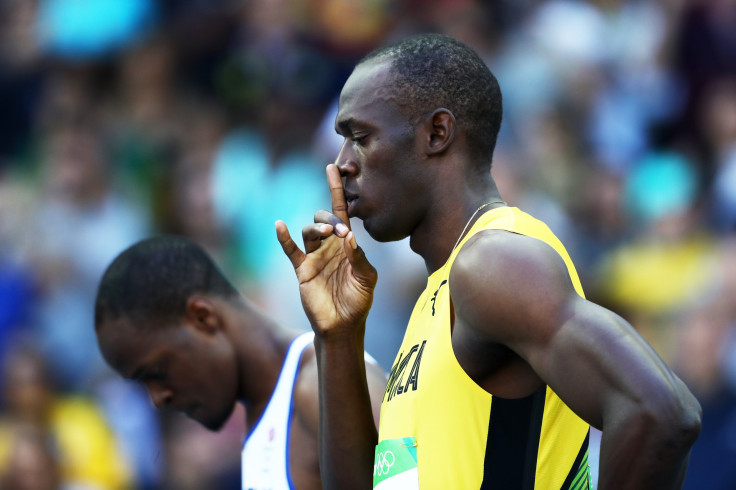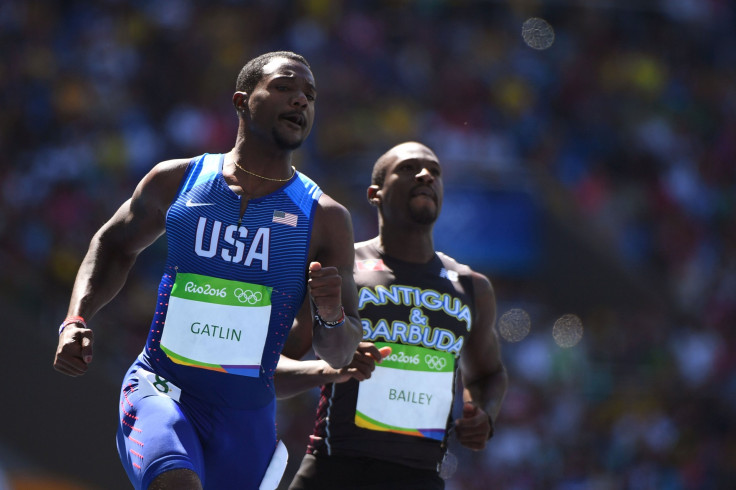Men's 100m Final Olympics 2016: Time, TV Channel, Live Stream Info; Usain Bolt Goes For Gold Record In Rio

Can anyone stop Usain Bolt? Eight years after he shot to superstardom by dominating in Beijing, that is once more the question heading toward Sunday's final of the men's 100 meters at the Rio Olympics. Since the Jamaican completed the sprint triple in 2008 by winning 100m, 200m and 4x100m gold, he has yet to taste a single defeat in a major championship. The only time he has failed to win gold was at the 2011 World Championships when he being disqualified for a false start in the final of the 100m.
No matter what form Bolt has been in heading toward a big event, he has always delivered with the top prize on the line, winning 17 titles across Olympics and World Championships. Already enshrined as the greatest sprinter of all time, the 29-year-old is now looking to complete an unprecedented “triple triple” of sprint events at the Olympic Games.
Only one man before him has even won two Olympic 100m golds, a feat Bolt completed in London four years ago, and American Carl Lewis' second triumph in 1988 remains shrouded by doping controversy.
In a sport and an event that has been so tainted by drugs, Bolt is athletics' shining light, never touched by the specter of cheating. The same cannot be said for the man expected to be Bolt's chief threat for gold on Sunday night at the Olympic Stadium, providing both men make it through their semifinals earlier in the evening.
At the World Championships last year, Bolt's meeting with Justin Gatlin was billed as good versus evil for the very soul of athletics, coming as it did in the wake of a host of doping scandals. With controversies continuing to hit track and field, most recently involving alleged state-sponsored doping in Russia, it is again easy to suggest that Bolt will be racing for far more than himself and his country in the flagship event on the track at the Olympic Stadium.
If Bolt is now used to, if still uncomfortable, with being told he carries the weight of his sport on his shoulders, Gatlin is all too familiar with any interview he faces being dominated by questions not about his world-leading times on the track but his doping history.
Gatlin has served two drug bans during his career, although the first of those was later reduced to one year on appeal when his explanation that the positive test came about because of medication he was taking for attention deficit disorder was accepted. His second ban, in 2006, cost him four years of his career, although he again disputed its validity, insisting that a massage therapist rubbed testosterone cream into his leg.
The focus on Russian athletes in Rio has lessened the spotlight on Gatlin thus far. However, some of the talk puts him and his team in an uncomfortable position. American swimmer Lilly King was defiant in her criticism of rival Yulia Efimova, who has served a 16-month ban and tested positive for banned substance meldonium earlier this year. King was adamant that those who have been caught doping should not compete at the Olympics.
“I don’t even know who Lilly King is,” was Gatlin's response after the first round of the 100m on Saturday. “She does swimming and I’m track and field, so I’m not worried about that. I've come back and did what I need to do, and I’ve worked hard and I get tested just like everybody else and I’m back here. I believe in the system. Everybody else believes in the system, too.”

The fact that he was forced to spend four years away from the sport is what the 34-year-old attributes to his ability to continue setting rapid times at an age when most sprinters are already a long way past their primes. The fastest man in the world last year, Gatlin has set the two fastest times this year, although his world-leading time of 9.80 seconds isn't quite as quick as he went in 2015. In the first round in Rio he was again the fastest man, crossing the line in 10.01 seconds.
It is not an unfamiliar situation for Bolt. Like last year, the 29-year-old has had a season disrupted by injury and hasn't put the times together to match his rivals. American Trayvon Bromell, second to Gatlin at the U.S. trials, and Jimmy Vicaut, the joint-fastest European in history, have both gone quicker than Bolt in 2016. And on Saturday, African champion Ben Youssef Meite and Canadian Andre De Grasse, bronze medalist at London 2012, went faster than the two-time defending gold medalist.
Bolt described his first race in Rio as “sluggish,” after a slow start contributed to him crossing the line in 10.07. Yet Bolt had eased up, in complete control of his heat with around 20 meters to go. He knows how to get the job done. And he remains very much the man to beat.
Men's 100m Olympic Final Details
Start Time: 9.25 p.m. EDT
TV Channel: NBC
Live Stream: NBCOlympics.com
© Copyright IBTimes 2024. All rights reserved.





















